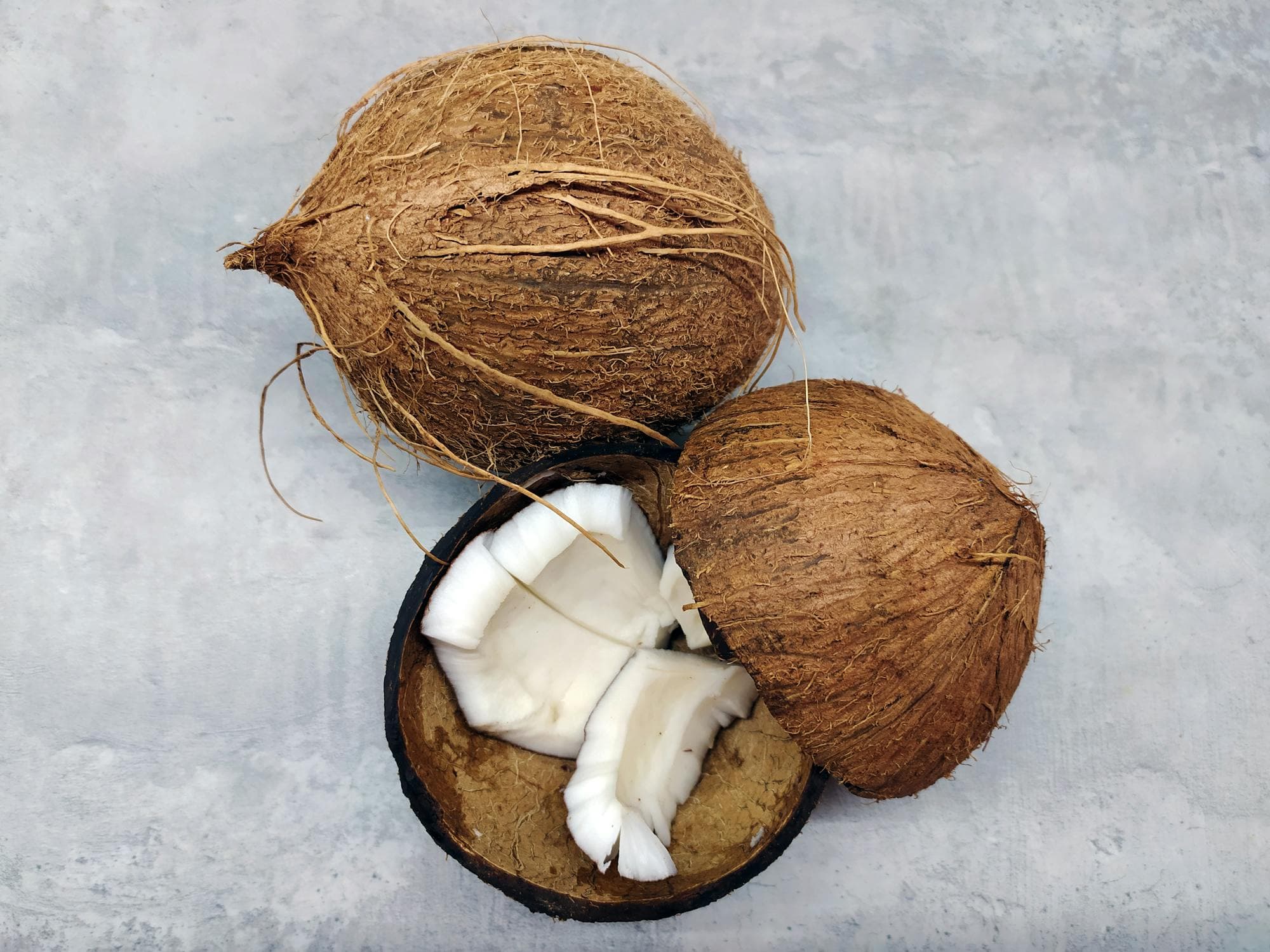Coconut is one of the most popular tropical fruits among humans. From freshening cocktails to scrumptious curries, people love adding coconut to their recipes to enhance the flavors. And so, while devouring this fruit, we often catch our cats eyeing and looking for a tiny, refreshing treat.
But can cats eat coconut? Though coconut is not harmful to cats, caution is advised. Let's dive in and learn about the potential benefits and risks of coconut for cats.
Can Cats Eat Coconut? The Short Answer
Yes, coconut in small amounts and its most natural, unprocessed form is usually non-toxic to cats, ASPCA confirms. However, avoid offering this tropical fruit to your kitty as a regular treat because it contains higher amounts of fat and fiber. Consuming too much coconut can cause digestive upset, potassium imbalance, and weight gain.
Which Coconut Products Are (and Aren’t) Safe for Cats?
While natural coconut is considered safe for cats, experts advise against certain coconut products. Here is a list to help you understand which products are okay and which aren't, and why.
Coconut Product | Is It Safe? | Notes |
Raw coconut flesh | ✅ In small amounts | High in fat and fiber |
Dried coconut | ⚠️ Use caution | May have sugar, preservatives |
Coconut milk (unsweetened) | ⚠️ Occasionally | High fat; avoid flavored or sweetened versions |
Coconut oil | ⚠️ Consult with your vet | Can cause diarrhea or weight gain |
Coconut water | ❌ Not recommended | High in potassium; may cause imbalances |
Coconut yogurt | ❌ Avoid | Contains sugar, additives, dairy base |
Potential Benefits of Coconut for Cats (If Given Properly)
Is coconut good for cats? Though it offers numerous benefits, too much of this refreshing fruit is not ideal for felines. According to an article by PetMD, coconut is a good source of lauric acid, having antimicrobial properties, and coconut oil contains medium-chain triglycerides (MCT), which can assist in digestion. The oil can also help with dry skin and coat, but make sure you use vet-approved oil.
However, these benefits have generally been studied in humans or dogs, and research on cats and coconut is lacking. So, it’s best to consult your veterinarian before introducing coconut to your feline friend.
Health Risks of Coconut for Cats
While coconut flesh, in moderation, can be a healthy snack for your cat, its high fiber and fat content are a matter of concern, which means consuming large amounts can cause health issues in cats.
Watch for these symptoms if your cat eats coconut → Diarrhea, upset stomach, or vomiting. This can happen due to high fiber.
While fiber usually helps in digestion, large amounts can lead to digestive issues. The fats in this fruit can lead to weight gain if given too often. Moreover, cats with sensitive stomachs are generally at a higher risk of pancreatitis. Coconut can also cause allergic reactions in cats, though rarely.
How to Safely Offer Coconut to Your Cat
If your cat likes the taste, you can serve plain, unsweetened coconut in tiny amounts, less than 1 tsp. It should be given only as an occasional treat and not as a regular part of their diet. Start with a small pea-sized piece of fresh coconut meat or a few drops of oil, and watch closely for any signs of digestive upset, like diarrhea or vomiting.
Remember to keep coconut mixed with chocolate, xylitol, or other artificial sweeteners away from your cat. Also, avoid processed coconut products because added sugars and flavorings can cause harm to cats.
Try This: A Tiny Coconut Cat Treat Recipe
If you are thinking about making a nice, easy, and tasty coconut treat for your feline companion, here is a simple and quick recipe you can try on a summer day: sardine soft serve. You only need 2 ingredients and a blender. Simple, right?
Ingredients:
½ can of coconut milk (unsweetened)
1 can of sardines in water (boneless, less than 10% sodium)
How to make it: Drain and rinse the sardines. Put them in the blender and pulse until you get a consistent, creamy mixture. Add half a can of coconut milk to the blender and pulse until mixed. Put this mixture into a plastic container with a lid and place it in the freezer to set overnight. Only serve 1 tablespoon at a time.

Can Coconut Oil Be Used Topically on Cats?
Topical use of coconut oil may seem a safe option for skin issues in cats, and some pet owners use it on cracked paw pads or dry skin. But it is always best to take advice from your vet before using it on your kitty, mainly because cats may lick the oil off. So, it is better to slowly introduce coconut oil topically to prevent GI upset.
When to Call the Vet
If your cat starts experiencing symptoms, such as vomiting, diarrhea, lethargy, or loss of appetite after consuming coconut or shows signs of allergic reaction, such as swelling, drooling, or itching, you need to call your vet immediately and get them checked.
Conclusion: Coconut Is Safe – But Only as a Tiny Treat
Though coconut is non-toxic for cats, it should be given only sparingly as an occasional treat, as it is not necessary in their regular diet. This is important because of its high fat and fiber content. Also, always prioritize balanced nutrition for your kitty; the best way to go about it is by consulting with your vet before introducing new human foods. You can also discuss innovative ideas for treats that are both healthy and tasty for cats.
Frequently Asked Questions
Can cats eat coconut oil?
According to PetMD, a tiny amount of high-quality coconut oil is usually safe for cats. But remember, moderation is the key, and it is best to consult with a vet before giving your cat coconut oil.
Can kittens eat coconut?
Kittens can eat small amounts of coconut in its most natural, unprocessed form. Since this fruit is loaded with fats, it is best to offer it sparingly and not as a part of their diet.
Can cats drink coconut water?
Though coconut water is non-toxic, avoid offering it to your cat because it is high in potassium and can cause imbalances, leading to certain health issues.
Can cats have coconut milk?
Coconut milk, in small quantities and only as an occasional treat, does not cause any health issues. However, avoid giving too much, as it is high in fat.
Is coconut oil good for cat hairballs?
Yes, cats can have coconut oil for hairballs, as its lubricating properties can help hair go through the digestive system easily.
How much coconut is too much?
Initially, the size of a little fingernail is enough for cats, and even after everything goes well, not more than a teaspoon should be given to them.






